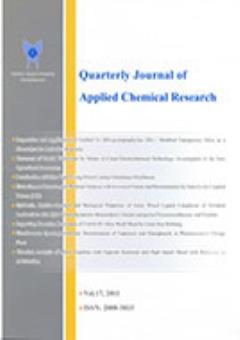Optimized and Scalable Methods for the Synthesis of Lauryl Amine Anti-Cake using Diborane
محورهای موضوعی : شیمی کاربردیmohammad javad taghizadeh 1 , MAHDI BAHARVAND 2
1 - irani
2 - DEPARTMENT OF CHEMISTRY,IMAM HOSSEIN UNIVERSITY
کلید واژه: Lauryl amine, Anti-cake, Surfactant, Reducing agent, Diborane.,
چکیده مقاله :
In this research, four improved and scalable methods for the synthesis of lauryl amine have been described. In this research, attempt has been by investigated the synthesis methods of lauryl amine, made to provide an easy and cost-effective method for the synthesis of lauryl amine as a surfactant and anti-cake with a wide range of applications. lauryl amine was synthesized from the primary materials of lauric acid, lauramide and lauronitrile in the presence of various catalysts and reducing agents. The advantages and disadvantages of each of these methods were investigated and compared to industrial methods. In the reduction of luramide and Lauronitrile to lauryl amine, diborane reductant was used as a new method for the first time. In this article, with an efficient and new method, lauryl amine was synthesized in the presence of ammonia and aluminum oxide with a overall yield of 63% from lauric acid. In this method, lauric acid is converted to Lauramide and finally reduced to lauryl amine.
In this research, four improved and scalable methods for the synthesis of lauryl amine have been described. In this research, attempt has been by investigated the synthesis methods of lauryl amine, made to provide an easy and cost-effective method for the synthesis of lauryl amine as a surfactant and anti-cake with a wide range of applications. lauryl amine was synthesized from the primary materials of lauric acid, lauramide and lauronitrile in the presence of various catalysts and reducing agents. The advantages and disadvantages of each of these methods were investigated and compared to industrial methods. In the reduction of luramide and Lauronitrile to lauryl amine, diborane reductant was used as a new method for the first time. In this article, with an efficient and new method, lauryl amine was synthesized in the presence of ammonia and aluminum oxide with a overall yield of 63% from lauric acid. In this method, lauric acid is converted to Lauramide and finally reduced to lauryl amine.


